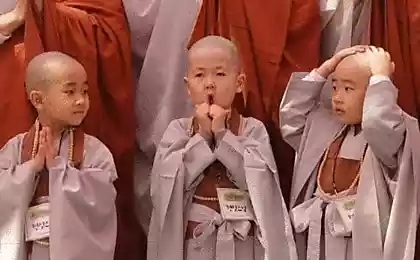613
The last living deity on the planet
These boginiVsё his childhood goddess of Nepal holds a princess. But sooner or later, the tale ends - Kumari Devi grew up, lose their divine right and back to the normal life of the world.
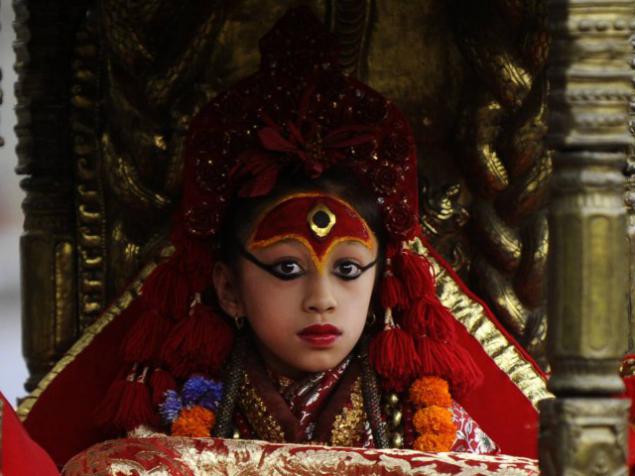
The concept of living or mortal gods, endowed with divine power, it is common in many cultures. Even at the dawn of human history, representatives of societies of ancient Mesopotamia worshiped the living embodiment of the gods. In Rome and Mexico pre-colonial period, there was also a similar tradition, but to this day it has been preserved only in Nepal.
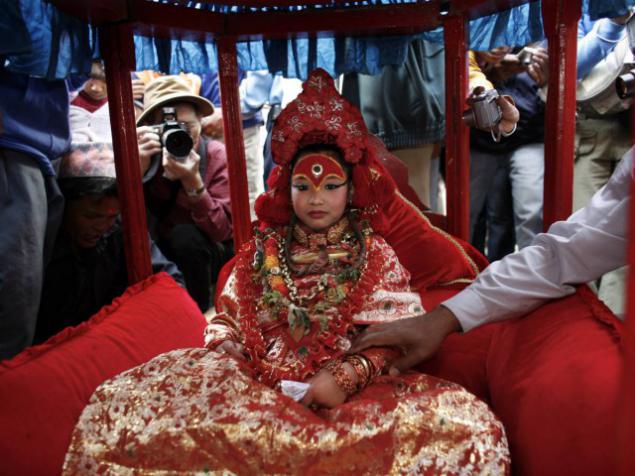
It is believed that the child-god is a physical incarnation of the Hindu goddess Durga militant. Future goddess worthy to possess the sacred power, carefully selected from the Newar caste Shakyu people. To be elected to the role of the goddess of the birthday girl should satisfy astrological conditions, and itself the candidates must comply with 32 physical parameters of the appropriate form of the thighs ("as a young female deer") to the tone of voice ("soft and clear like a duck").
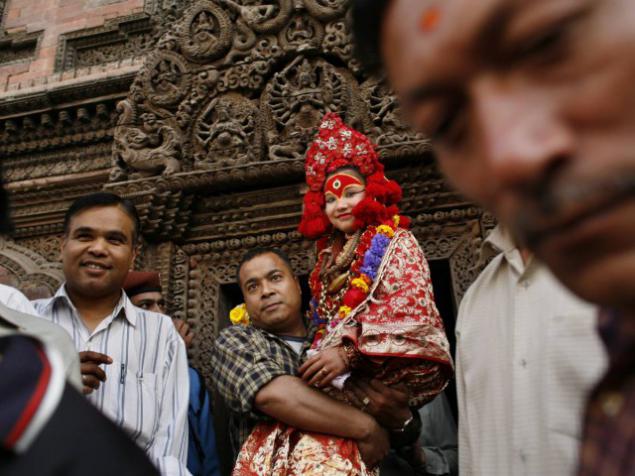
Normally the jury, consisting of Buddhist monks, selects several Kumari Devi. Royal Kumari is selected from the number of children whose families occupy high social position, and then it becomes the home of a special palace in Kathmandu. Other Kumari live in remote towns of Nepal with their families and a group of priests.
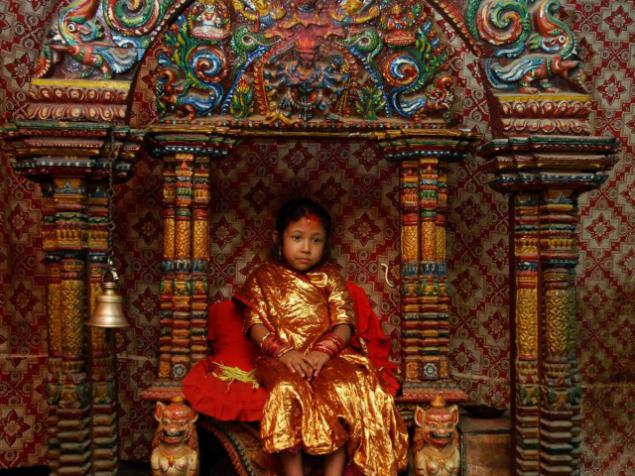
Some girls occupy a place of honor of the goddess throughout childhood. However, in smaller towns Kumari Devi elected only at the time of special occasions. Kumari is selected from the girls from two to four years. If Kumari Devi is fully committed to religious duties, its once hidden from human eyes, as even her eyes a person is considered a blessing that should not be wasted. All Kumari his childhood spent in the room, and her company make only local priests, family and selected friends, belonging to her caste.
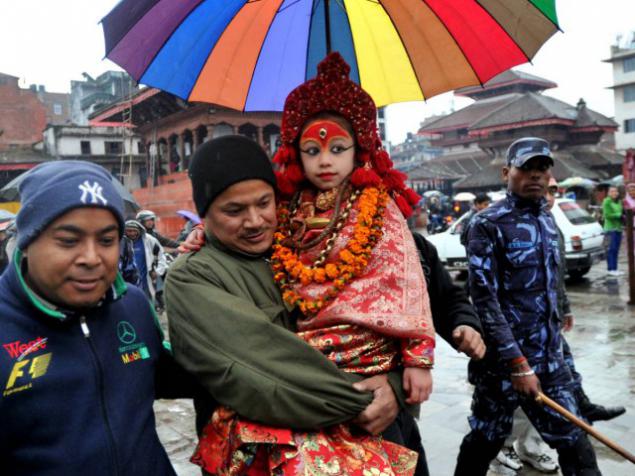
Kumari receives priests, dignitaries and sometimes religious pilgrims, listens to their requests, offering their support and give his blessing, provided that it is approved by the spirit of the goddess, who lives in it.
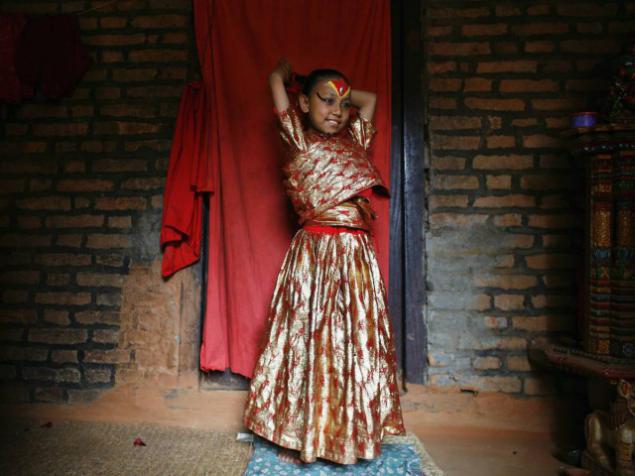
During the festive ceremonies and events held outside the palace, the Kumari are not allowed to touch the ground legs. In public face of the inner circle are everywhere Kumari in her arms, on a gold palanquin, or carry in a special cart. This is done for two reasons: firstly, because the goddess retains its purity (named "Kumari" is literally translated as "virgin"), and secondly, her legs become sacred, and asylum, touching them forehead, hoping to get rid of their difficulties and illnesses.
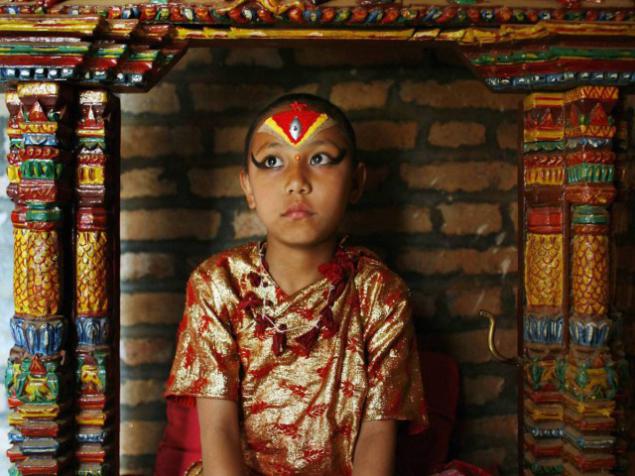
After touching the feet of the Kumari had received the blessing of the third eye is activated. Each of the Kumari is also present a third eye, which is drawn on the forehead of the girl as a symbol of special spiritual power. Family goddess responsible for her daily makeup and helps it to carry out their ritual role throughout childhood.
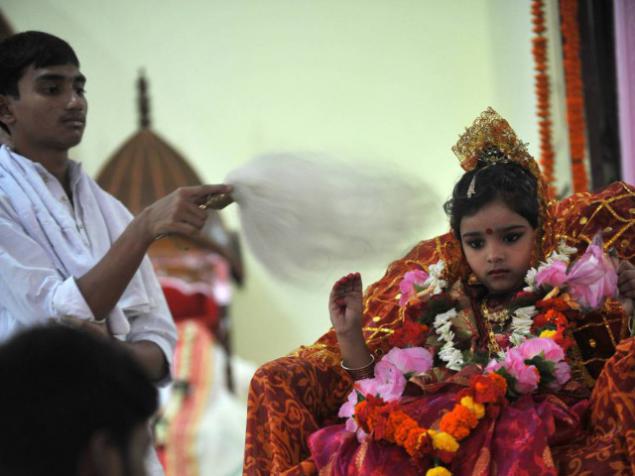
Having a child who was chosen for the role of Kumari, it is considered a blessing for the whole family, but, in truth, it is rather not a privilege, but rather a tedious duty.
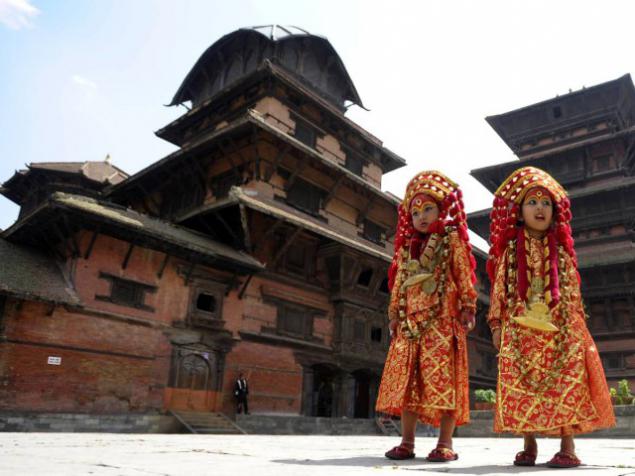
In fact, the activities of the Kumari Devi is exempt from politicking and focus on the goodness and help people. Life is joyful and serene goddess, but everything eventually comes to an end. Once Kumari first menstruation begins, it automatically loses her divine status and can no longer serve as a sacred vessel for the spirit of the goddess. In twelve days Kumari isolated from people other than women of her entourage to hold a special meditation. On the last day of the former goddess allowed to go out, and now she can walk among the people like a normal teenage girl.
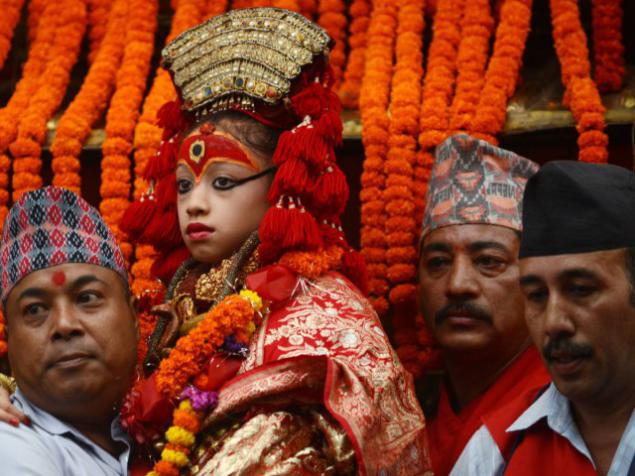
According to a former Kumari, the transformation of an ordinary girl goddess passes painful. The overthrow of a place of honor occurs suddenly, and it means that the rest of her life the girl will not get the high level of respect and reverence, to which she was accustomed from childhood.
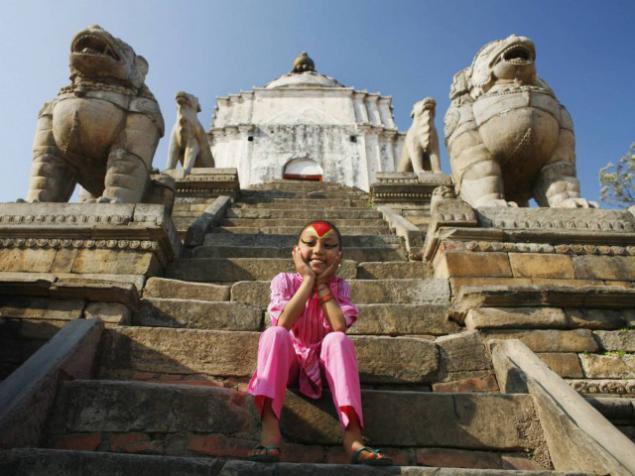
Critics call this tradition veiled form of child labor and consider it a restriction of freedom of the child. However, in 2008 the Supreme Court of Nepal has canceled the petition against the custom, stating that the Kumari are of great religious significance.
via mixstuff.ru/archives/83064

The concept of living or mortal gods, endowed with divine power, it is common in many cultures. Even at the dawn of human history, representatives of societies of ancient Mesopotamia worshiped the living embodiment of the gods. In Rome and Mexico pre-colonial period, there was also a similar tradition, but to this day it has been preserved only in Nepal.

It is believed that the child-god is a physical incarnation of the Hindu goddess Durga militant. Future goddess worthy to possess the sacred power, carefully selected from the Newar caste Shakyu people. To be elected to the role of the goddess of the birthday girl should satisfy astrological conditions, and itself the candidates must comply with 32 physical parameters of the appropriate form of the thighs ("as a young female deer") to the tone of voice ("soft and clear like a duck").

Normally the jury, consisting of Buddhist monks, selects several Kumari Devi. Royal Kumari is selected from the number of children whose families occupy high social position, and then it becomes the home of a special palace in Kathmandu. Other Kumari live in remote towns of Nepal with their families and a group of priests.

Some girls occupy a place of honor of the goddess throughout childhood. However, in smaller towns Kumari Devi elected only at the time of special occasions. Kumari is selected from the girls from two to four years. If Kumari Devi is fully committed to religious duties, its once hidden from human eyes, as even her eyes a person is considered a blessing that should not be wasted. All Kumari his childhood spent in the room, and her company make only local priests, family and selected friends, belonging to her caste.

Kumari receives priests, dignitaries and sometimes religious pilgrims, listens to their requests, offering their support and give his blessing, provided that it is approved by the spirit of the goddess, who lives in it.

During the festive ceremonies and events held outside the palace, the Kumari are not allowed to touch the ground legs. In public face of the inner circle are everywhere Kumari in her arms, on a gold palanquin, or carry in a special cart. This is done for two reasons: firstly, because the goddess retains its purity (named "Kumari" is literally translated as "virgin"), and secondly, her legs become sacred, and asylum, touching them forehead, hoping to get rid of their difficulties and illnesses.

After touching the feet of the Kumari had received the blessing of the third eye is activated. Each of the Kumari is also present a third eye, which is drawn on the forehead of the girl as a symbol of special spiritual power. Family goddess responsible for her daily makeup and helps it to carry out their ritual role throughout childhood.

Having a child who was chosen for the role of Kumari, it is considered a blessing for the whole family, but, in truth, it is rather not a privilege, but rather a tedious duty.

In fact, the activities of the Kumari Devi is exempt from politicking and focus on the goodness and help people. Life is joyful and serene goddess, but everything eventually comes to an end. Once Kumari first menstruation begins, it automatically loses her divine status and can no longer serve as a sacred vessel for the spirit of the goddess. In twelve days Kumari isolated from people other than women of her entourage to hold a special meditation. On the last day of the former goddess allowed to go out, and now she can walk among the people like a normal teenage girl.

According to a former Kumari, the transformation of an ordinary girl goddess passes painful. The overthrow of a place of honor occurs suddenly, and it means that the rest of her life the girl will not get the high level of respect and reverence, to which she was accustomed from childhood.

Critics call this tradition veiled form of child labor and consider it a restriction of freedom of the child. However, in 2008 the Supreme Court of Nepal has canceled the petition against the custom, stating that the Kumari are of great religious significance.
via mixstuff.ru/archives/83064
On Earth ends with drinking water
"I do not have a smartphone ': why ordinary mobile phones are in fashion again
























